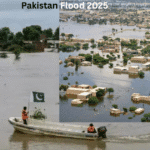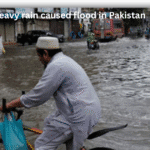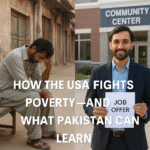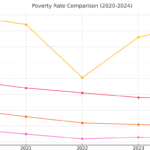By overseaeyes.com
Last year, when I was in Pakistan, a few relatives and friends sat with me over chai and said something that hit hard:
“You guys are treated like third-class citizens abroad. Why don’t you just come back and live with dignity?“
And this wasn’t just a passing comment. Some people truly believe that overseas Pakistanis suffer silently in foreign countries, doing “humiliating” jobs, losing their identity, raising kids without values, and all for a Western passport.
So today, I want to speak from my heart. As someone who has lived overseas for over a decade, here’s what life abroad really looks like—and why this narrative is not only wrong, but unfair.
1. No One Said It’s Easy—But It’s Dignified
Let’s be real: many overseas Pakistanis do tough jobs. Some drive taxis, work in restaurants, clean buildings. And yes, some clean toilets. But does that mean they’re humiliated?
Absolutely not.
Because abroad, every job is respected. A janitor or a cab driver is treated with dignity. No one looks down on them. They get benefits, follow labor laws, and have rights.
Back home, even a Master’s degree holder might be sitting jobless, waiting for a “reference” to get hired. Hard work is nothing to be ashamed of; it’s honorable.
2. Our Kids Aren’t Losing Values—They’re Gaining Perspective
Another thing I hear often is, “Your kids will grow up with no Islamic or moral values.”
Honestly? That’s not true.
In fact, we put in extra effort to keep our culture alive. We speak Urdu or Punjabi at home. We celebrate Eid and teach our children about Islamic values. We take them to weekend Islamic schools. We keep the traditions going—just in a different setting.
At the same time, our kids also learn to respect all faiths, be kind to everyone, and stand up for fairness. They may grow up in the West, but they’re not lost. They’re enriched.
3. We’re Not Running From Pakistan—We’re Chasing Opportunity
We didn’t leave Pakistan because we were ashamed. We left because we wanted to give our families something better. According to Express Tribune In just the first six months of 2024, over 800,000 Pakistanis left the country; approximately 100,000 were highly trained professionals. (doctors, engineers, IT specialists, accountants, like that), you know why…
They all wanted:
-
Safe streets
-
Clean water
-
A working healthcare system
-
Fair schools
-
Electricity that stays on
These things shouldn’t be luxuries. But in Pakistan, sadly, they still are.
Abroad, we may not live in luxury, but we live with systems that work. That’s all we wanted—for our kids to grow up safe, educated, and hopeful.
4. Immigrants Are Not Disposable—They’re Essential
Some say that when crisis hits, Western countries show their “real face” to immigrants.
Let’s rewind to COVID-19.
In Canada and the U.S., immigrants weren’t pushed aside—they were front-line workers. Doctors. Nurses. Truck drivers. Grocery store workers. They kept the countries running.
These governments gave stimulus checks. Free COVID tests. Unemployment aid. Food support. Even undocumented workers in some places got help.
Compare that to back home, where even citizens didn’t get consistent support. So no, we weren’t “kicked out.” We were counted in.
5. Respect Isn’t Guaranteed Anywhere—It’s Earned
Some people think a Western passport equals automatic respect. But here’s the truth: respect isn’t given freely anywhere—it’s earned.
In North America, the system respects people. You can vote, protest, and speak your mind. Even if you’re an immigrant, the law is designed to protect you.
Now let’s talk about Pakistan. Can you do what I mentioned above in Pakistan?
We always believed we elect our leaders, right? But after what we saw in the 2024 elections, it’s clear—our votes don’t decide who holds power. That’s why people feel unheard. Because if we don’t elect leaders, they don’t answer to us.
So they ignore broken roads. They ignore hospitals. They don’t fix anything, because they don’t owe the people anything. That’s what happens when public servants are selected and not elected.
In contrast, in countries like the U.S. and Canada, leaders know they can be voted out. That pressure forces them to listen. That’s how systems improve.
So no, we’re not “serving foreigners.” We’re part of a system that works for everyone.
A Personal Note from Me:
I’ve been living abroad for more than ten years. When I returned to Pakistan last year, I didn’t put on airs or act differently. I came back as someone who still loves his homeland.
But it hurt to hear people say I sold my dignity.
No—I didn’t.
I just wanted a life where my children could walk safely to school, where the electricity stays on, and where hard work is enough to earn respect. Where the system supports, not suffocates.
Let’s Be Honest With Ourselves
Nobody leaves home unless they have to.
Overseas Pakistanis aren’t perfect, but we’re not traitors either. We’re not ashamed of our roots—we’re proud of them. We carry our culture, our values, and our faith wherever we go.
We send money home. We build schools, hospitals, and mosques in our villages. We fly home for funerals and weddings. We care.
So instead of questioning our choices, maybe ask:
Why did we feel the need to leave in the first place?
And what can we fix so others don’t have to leave, too?
Conclusion:
Being an overseas Pakistani isn’t easy. It means juggling two worlds, two identities, and a thousand expectations. It’s easy to judge from the outside. But unless you’ve stood in an immigration line, worked 16-hour shifts, or juggled two jobs while raising kids in a foreign land, you don’t know what it takes.
So let’s stop tearing each other down.
Overseas Pakistanis are not perfect. But we are trying. Trying to survive. Trying to thrive. Trying to give our kids what we couldn’t have.
Not for pride. Not for dollars. Not for luxury
But for dignity.










